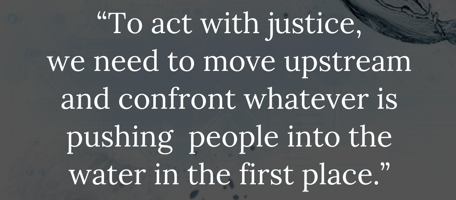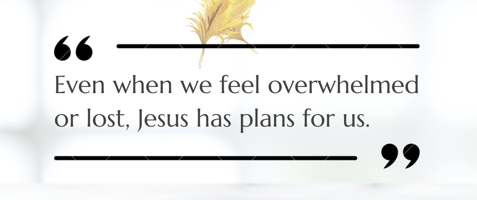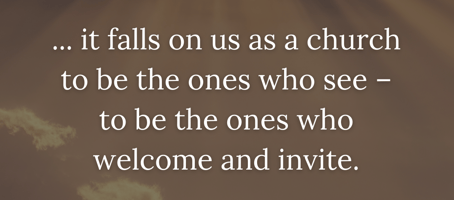During Plymouth Church’s Just Peace Sunday worship services, we pray for worldwide peace and...
What Does Justice Look Like For You?

This blog is based on a sermon by Pastor Teresa Howell-Smith on January 19, 2025
Mother Teresa was once invited to a hunger conference in Mumbai. During her travels, she lost her way and, as a result, arrived late. On the steps outside, she noticed a man dying of hunger. Instead of ignoring him, she fed him. Ironically, indoors at the conference, people were discussing statistics behind food supply while this person was starving outside.
At another point in Mother Teresa’s life, a wealthy woman from America offered to cut her a check in order to support the work she was doing. Mother Teresa shook her and replied, “No money.” The wealthy woman was flabbergasted – she had a lot of money, and she thought that the donation would help Mother Teresa’s cause. But Mother Teresa would not budge. So the wealthy woman asked, “Well then, what can I do to help?”
Mother Teresa smiled and led the woman deep into the boroughs of Calcutta until they finally came to a child. “Take care of her,” Mother Teresa said. The wealthy woman fed the child, and later reported that this experience changed her life.
Mother Teresa once said that people who want to help don’t have to go to Calcutta to do so – Calcutta is everywhere. Calcutta is where you are. Wherever you are, there are people who are hurting and in need of love. Find them. Love them. For in loving them, you also love Jesus. In many ways, this is what Amos is telling us in chapter five of the Book of Amos. He critiques those who engage in religious practice without addressing societal injustice. He insists that God isn’t interested in false religious posturing, festivals, offerings and songs. The issue with these things isn't the practice itself – it's that they’re incomplete and insincere without justice, care and love for one another.
Amos focuses heavily on themes of justice and righteousness. He famously stated, “But let justice roll down like waters, and righteousness like an ever-flowing stream.” This powerful image emphasizes a need for fairness in our society. He also used the metaphor of a plumb line. God comes to Amos in a vision, standing next to a wall with a plumb line. He explains that it represents a standard set by Him to measure the people of Israel – that he was serious about no longer letting injustices continue to go unaddressed.
In the Old Testament, the Hebrew term for “justice” involves caring for those who are most in need. Amos highlighted that true spirituality can be judged by how we treat others – especially the less fortunate. This calls for significant changes in our lives, which is also challenging.
Amos laid out the solution for the people of Israel with the phrase, “Seek God, and you will have life.” Dr. Martin Luther King Jr. once likened reading The Bible to surgery, suggesting that it often uncovers uncomfortable truths that we need to face. To improve, we must turn to God and move away from unjust practices. Dr. King frequently quoted Amos, especially the line about flowing waters and righteousness. This phrase might sound familiar because it's inscribed on the Civil Rights Memorial in Montgomery, Alabama. We hear these words and they feel refreshing and hopeful like a drink of water in a dry desert. If we look at the context leading up to Amos speaking these famous lines, we can see his urgent message more clearly. He criticized the people’s rituals again, saying, “I hate your festivals and solemn gatherings,” underscoring that true justice is far more important than mere tradition.
Amos speaks a warning: “Woe to you who long for the Day of the Lord.” This means that wishing for this day can be misleading because it's not just a joyful event, but we are to focus on the work of justice. For many, the Day of the Lord brings comfort, offering a hope for a better future. However, the prophet Amos challenged the people, reminding them that they had overlooked what God expects of them. He points out that their practices do not align with God’s true desires.
Amos’ declaration about justice rolling down like water means that God truly values justice and wants us to care for those in need. If we’re not aware of the struggles around us, we’re missing the core of what it means to live rightly. There’s a saying that goes, “Don’t be so heavenly minded that you are no earthly good.”
When Amos talks about the river, some translations choose the word “ocean,” which invokes a vast sense of justice. However, the word “river” captures the steady, flowing nature of justice more effectively. The river represents an ongoing effort to seek justice in our daily lives. Justice isn’t just something we can hand off to politicians to fix – it's our responsibility too.
True justice should be a constant part of our actions and passions. Understanding the river of justice helps us see more clearly what truly matters to God. When we recognize the needs around us, we align more closely to the heart of God.
Biblical scholar Walter Brueggemann states that there are two parts of the prophetic task. First, the prophetic critiques the dominant consciousness and announces that God is dismantling and destroying every unjust structure – every system of oppression.
Second, the prophet energizes the imagination and announces the new good that God is building and planting in place.
The prophetic writings collected in the book of Amos live almost entirely in the first task. Amos is confronting systems of oppression and injustice so massive that Amos’ writings are devoted entirely to dismantling unjust systems. “You sell people for silver,” he says. “You trample on the heads of the poor. You deny justice to the oppressed.”
In his speech, Dr. King uses imagery of valleys as a powerful metaphor. He talks about the need to rise from the dark and desolate valley of segregation and move towards a brighter path of racial justice. He urges his community to not wallow in the valley of despair. For Dr. King, the valley represents a place of injustice – a low point in society where people face segregation, violence and inequality. But he believes that through the glory of God, this valley can be transformed into something better – like a high mountain where everyone can thrive together.
Dr. King envisions a community where people work side by side, pray together and fight for freedom together. In his interpretation of the Book of Isaiah, Dr. King believes that it is up to the community to raise the valley and create a just society. He talks about building what he calls a “beloved community” – a place free from racism and poverty and violence. He calls on everyone to work, pray, and stand together so that justice flows freely like water.
But what does justice flowing freely like water mean to us? I remember a woman inviting me over for dinner even though times were hard for her family and money was tight. I felt bad about her situation, but despite her struggles, she still showed up every day for herself and for her kids, and continued to extend hospitality to guests despite having very little herself.
We saw justice flow freely like water when the Jericho Walkers showed up for weeks to stand up for immigrant families. We see justice flow freely in the work that we do with Kinship Community Food Center or the Guest House of Milwaukee, reminding the guests that those organizations serve that they are our neighbors too.
How do we let justice and righteousness flow like an ever-running stream? Maybe it's leaning into the light of Epiphany and seizing to uncover what God may be leading us to. Perhaps he's calling us to read up on some issues that are burning in our hearts. It could be something as simple as a selfless donation to a good cause.
What does justice look like for us? I’m reminded of Reverend Scott Clark, who asks us to remember that we are in a season of Epiphany. As we experience things that are bigger than us – as we experience God’s presence – we must manifest in the midst of us and find our work to do. We will occasionally experience unjust systems that are bigger and stronger than any of us, but we are called upon to remember the words of Amos: We experience God’s clear and steady determination and unjust systems and structures will be dismantled so that all of God’s children can live free.
In his sermon “A Knock at Midnight,” Dr. King says that the church must be reminded that it is not the master or the servant of the state, but rather the conscience of the state. It must be the guide and the critic of the state, but never its tool. If the church does not recapture its prophetic zeal, it will become an irrelevant social club without moral or spiritual authority.
What does justice look like for you?
Hallelujah and amen.




